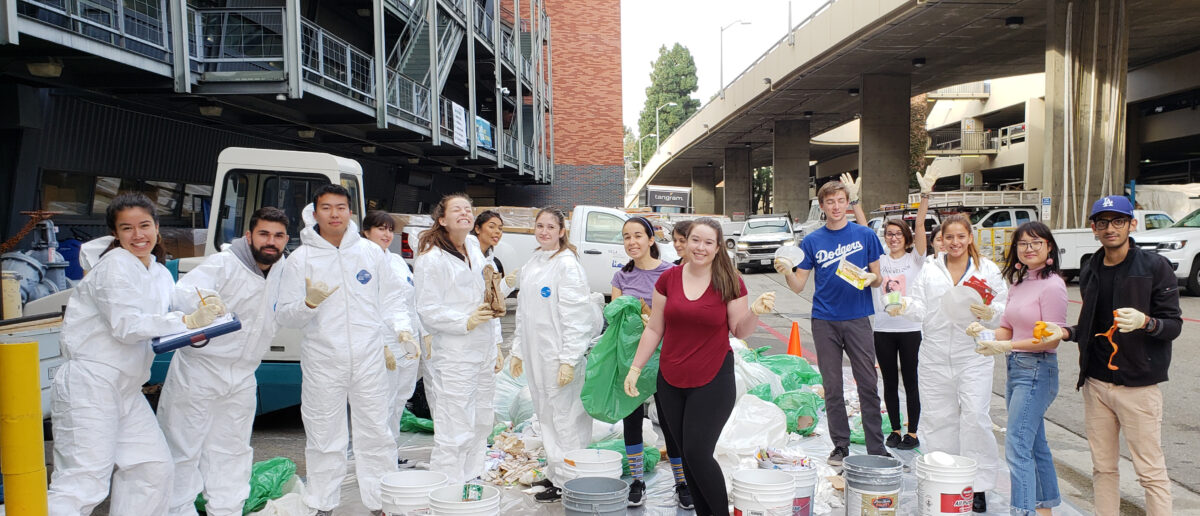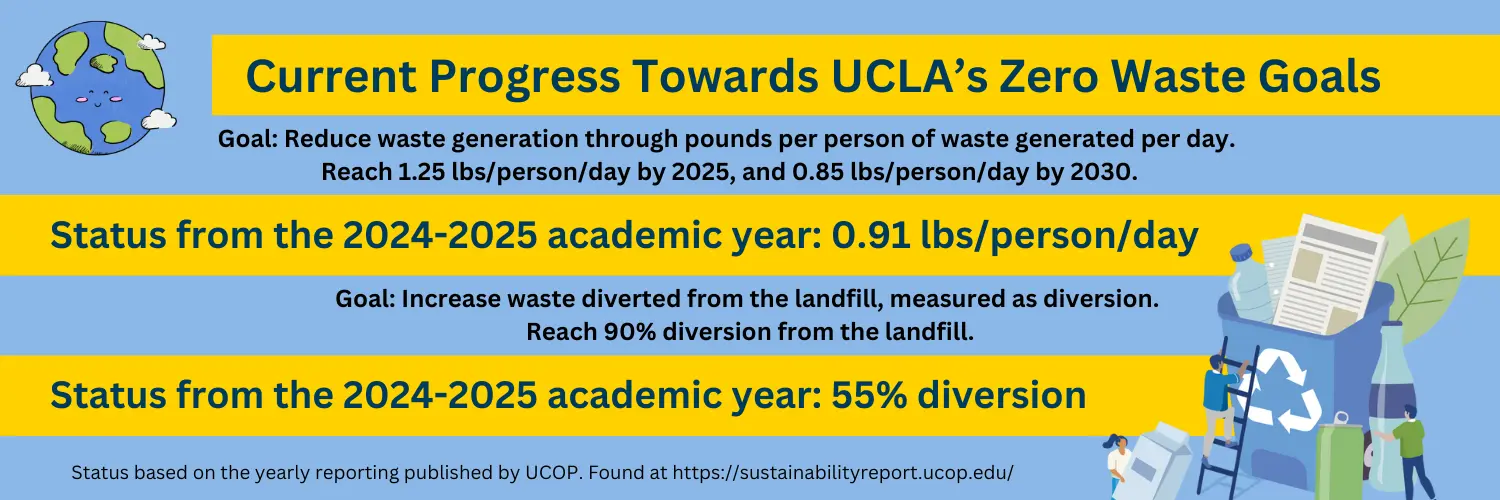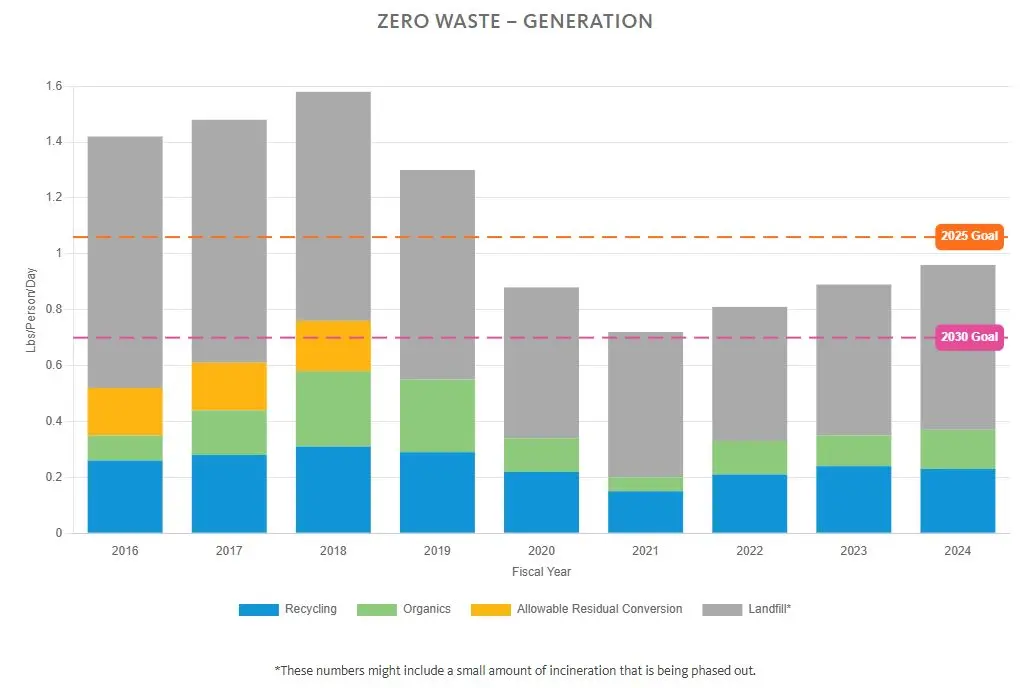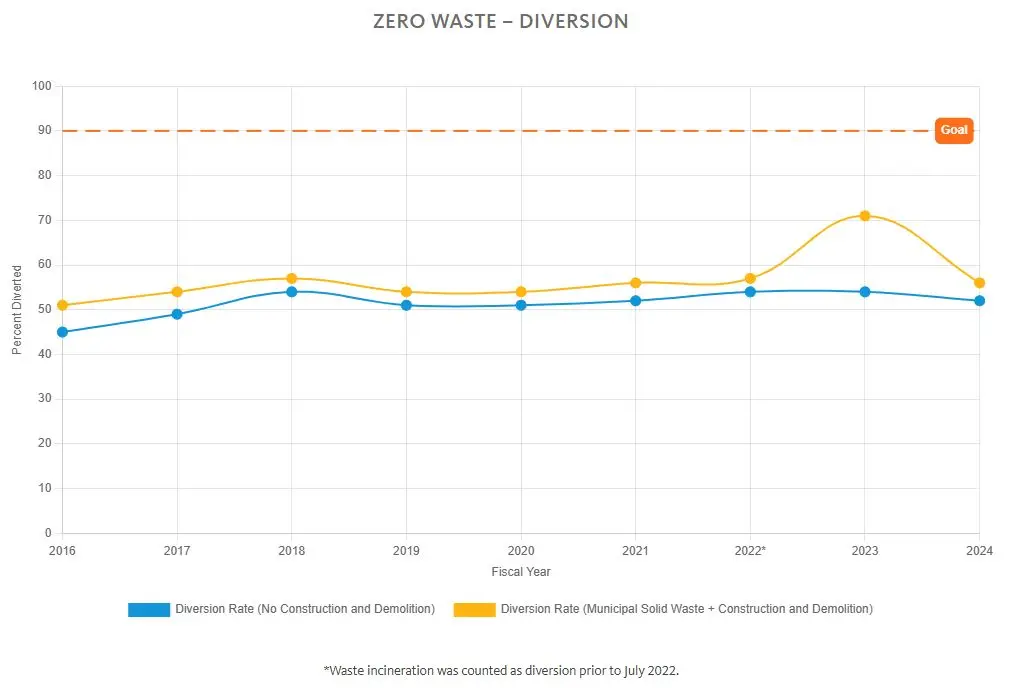

UCLA has a comprehensive recycling and waste management program and is pursuing eliminating single-use plastics on campus per both the UC Policy on Sustainable Practices, and UCLA’s own Single-Use Plastics Policy, which bans plastics to a degree past the UC wide policy. The University also addresses Zero Waste in the recent campus wide Sustainability Plan by outlining diversion and reduction goals, the waste section of which is linked above.
To reach our ambitious waste reduction and diversion goals, we need help from the entire UCLA community. This means taking daily, meaningful steps towards more sustainable options. If you have questions about what goes in the different bins, or how to recycle different materials, check out our FAQs and all of our resources throughout this webpage.
Current Projects and Initiatives
June 2024 marked the first year UCLA engaged in a large scale move out event to collect usable goods that would otherwise be disposed of. This way we can ensure more items have their life prolonged and both avoid the landfill, and help others who may need them.
Being the first year this program will be evolving as we work to scale it, you can find information about what went on last year at the Move Out Resources webpage. Once information for next year is set, you will be able to find drop off days at that link. Please make sure your usable furniture and other home goods don’t go to waste!
UCLA is committed to reducing the university’s environmental impact and developed a Single-Use Plastics Policy. The policy will phase out food accessory items such as plastic utensils, cups, lids, bowls, plastic bags, and ultimately eliminate single-use plastic water bottles while increasing access to water-refilling hydration stations. This is envisioned to cover not just sit-down and take-out restaurants, but everything from conferences, catered meetings, and events large and small.
As campus moves forward with standardizing centralized waste collection, Facilities Management will be providing 3-stream containers, which will greatly expand waste diverting capacity and allow users to sort their waste into compost, recycling, and landfill streams. Personal desk-side waste baskets will no longer be serviced and building occupants will need to bring and sort their waste at centralized waste bins strategically placed throughout our facilities. Additionally, liners will no longer be provided for personal desk-side waste baskets to reduce the amount of plastic generated on campus. Please refer to our FAQ page, Centralized Waste Etiquette, and Waste Bin Requirements to help you answer any questions you may have or contact zerowaste@ucla.edu.
The Centralized Waste Do’s and Don’ts is available for download and sharing. Other resources you may wish to view are on the FAQ on centralized waste in English and Spanish. Please email any questions you may have to sustainability@ucla.edu.
As campus updates and standardizes infrastructure, Facilities Management has published a Waste Bin Requirements document is available to ensure that departments purchasing receptacles meet Facility Management’s Scope of Work and have consistent messaging. This document provides guidance on placement of waste receptacles and offers options for waste bins.
Partnerships
Contact us at zerowaste@ucla.edu if you wish to donate any materials to any of our partners.
Our Zero Waste team partners with the Community Programs Office (CPO). CPO Food Closet to provide meals to students who are experiencing food insecurity due to financial hardship, and in turn reducing food waste. With a text based service called Bruin Bites, campus community members can receive notifications about when free food is available. For details on how to donate to these efforts, check out the UCLA Food Recovery Implementation Guide.
Are you planning an office clean-out and have a lot of usable supplies for students? UCLA is working with various student organizations that will provide resources to students at no cost.
To achieve highest and best use of materials, UCLA has partnered with Human-I-T to refurbish electronic waste (including lab equipment) rather than sending the materials to be recycled. The refurbished products will be provided to low-income individuals, under-served communities, and nonprofits in need of technology, internet, and digital training. The remaining non-salvageable goods will be recycled through a certified process. You can learn more about human-I-T by clicking here or submit an e-waste request through the Recycling Request Form.
UCLA does not currently partner with one specific donation partner. We would love to add to our resources of partners. Please reach out if you can help divert and rehome large amounts of office furniture.
Otherwise to help you determine what furniture is considered “good and resalable”, click here to view the slides provided by Habitat for Humanity of Greater Los Angeles. This is specifically for what Habitat accepts. The UCLA Thrift Store also accepts donations of many kinds and can pick up some items.
Waste Data Reports and Plans
Below you will find graphs illustrating UCLA’s reduction in waste created overall and per person per day, and UCLA’s diversion rate since 2016 (when current UCOP goals were set). These graphs and the information are from the yearly sustainability reporting put out by UCOP, with information gathered from each campus. This diversion rate encompasses all streams onsite, whereas the Quarterly Waste Reports, linked below, are only the information from our hauler on our Municipal Solid Waste (MSW) streams of recycling, composting, and landfill. The graphs below currently are from the report through the end of the 2023-2024 academic year.


Waste Reports
- 2024-2025 UCLA Year End Quarterly Waste Report
- 2023-2024 UCLA UCOP Sustainability Report
- 2022-2023 UCLA UCOP Sustainability Report
- 2021-2022 Quarterly Waste Reports: Q3 | Q2 | Q1
- 2019-2021 FY Waste Report
Media and Awards
- UCLA Newsroom: UCLA developing policy to phase out single-use plastics
- UC Carbon Neutrality Initiative: How do we break our addiction to plastic?
- Athens Services and UCLA join to “Feed People, Not Landfills”
- UCLA Newsroom: UCLA turns student cast-offs into cash for a good cause
